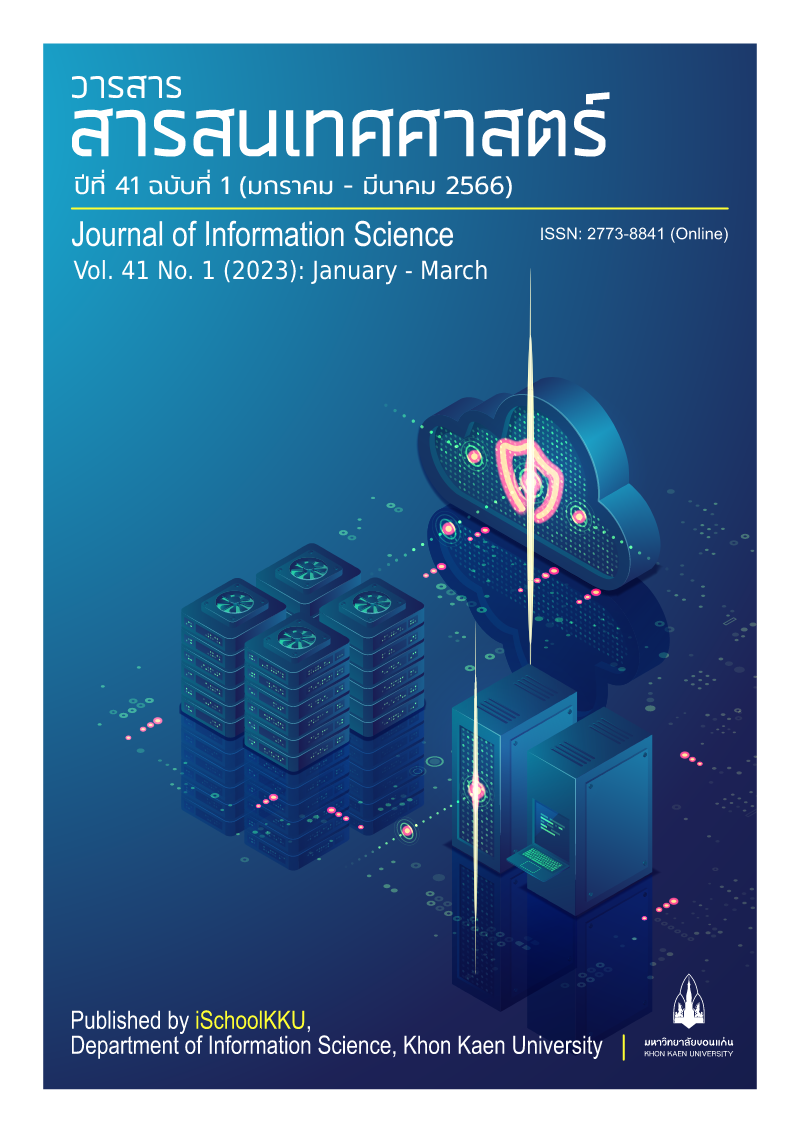The Development of Health Information Literacy Test for the Elderly in Senior Citizen Club, Bangkok Public Health Center
DOI:
https://doi.org/10.14456/jiskku.2023.1Keywords:
Health information literacy test, Health information literacy, ElderlyAbstract
Purpose: This research focuses on the development of the health information literacy test for the elderly in the Senior Citizen Club of Bangkok Public Health Center.
Methodology: This research and development study (R & D) systematically constructed a health information literacy test by dividing its construction into 2 phases: 1) health information literacy test construction and 2) the test quality assessment by examining its content reliability, difficulty, and discrimination power.
Findings: This health information literacy test was a multiple-choice form comprising 30 items assessing 3 test aspects: 1) health information access 2) health information evaluation and 3) health information application. The analysis of the assessment of the test quality data, in addition, revealed that the test quality met the acceptable criteria. As a result of this test quality measurement, this test was found to be of good quality as well as to be used for assessing the health information literacy of the elderly.
Applications of the study: Bangkok and provincial public health service centers and other concerned agencies can use this developed test to measure senior citizens' health information literacy. Also, it can be used as a guideline for developing health information literacy tests for other target groups.
Downloads
References
Anderson, L. W., & Krathwohl, D. R. (2001). A taxonomy for learning, teaching, and assessing: a revision of Bloom’s taxonomy of educational objectives. New York: Addison Wesley Longman.
Association of College and Research Libraries. (2000). Competency standards for higher education standards, performance indicator information literacy and outcomes. Retrieved 7 January 2021, from https://alair.ala.org/bitstream/handle/11213/7668/ACRL%20Information%20Literacy%20Competency%20Standards%20for%20Higher%20Education.pdf?sequence=1&isAllowed=y
Chang, L. (2011). Health literacy, self-reported status and health promotion behaviors for adolescents in Taiwan. Journal of Clinical Nursing, 20(16), 190-196.
Downing, S. M., & Haladyna, T. M. (2006). Handbook of test development. MahWah, New Jersey: Lawrence Erlbaum Associates.
Duangthipsirikul, S. (2014). Aging society with the challenges of health management. (In Thai). Assessment project Health Technology and Policy, 2(17), 1-4.
Foundation of Thai Gerontology Research and Development Institute. (2016). Situation of the Thai elderly 2016. (In Thai). Bangkok: Foundation.
Health Education Division. (2018). Enhancing and assessing health literacy and health behaviors children and youth aged 7-14 years and people aged 15 years and over. (In Thai). Nonthaburi: Department of Health Service support.
Ishikawa, H., Nomura, K., Sato, M., & Yano, E. (2008). Developing a measure of communicative and critical health literacy: a pilot study of Japanese office workers. Health Promotion International, 23(3), 269-274.
Kamkum, N. (2019). A study of health literacy of older persons, Bangkok metropolis. (In Thai). Master of Nursing Science in Nursing Science Field of Study of Nursing Science, Faculty of Nursing, Chulalongkorn University.
Kuder, F. G., & Richardson, M. W. (1937). The theory of the estimation of test reliability. psychometrika, 2(September 1937), 151-160.
Levin-Zamir, D. (2012). Health literacy in Israel : Policy, action, research and beyond. Retrieved 11 October 2020, from https://www.nap.edu/read/18325/chapter/6
Longseng, R. (2017). The development of health behavior literacy assessment tools for elderly in Songkhla province. Journal of Faculty of Education Pibulsongkram Rajabhat University, 4(2), 93-111.
Medical Library Association. (2007). Health information literacy. Retrieved 7 January 2021, from http://www.malnet.org/resources/health/define.html
Nakasenee, S. (2018). Self-healthcare behavior of the elderly in Bangkok. (In Thai). Rajabhat Rambhai Barni Research Journal, 12(1), 39-48.
Nilnate, W. (2014). Health literacy in Thai elders in senior citizens club of Bangkok (In Thai). Doctor of Philosophy Program in Health Research and Management, Faculty of Medicine, Chulalongkorn University.
Noppakraw, J. (2017). Health Literacy and Self-Management in Older Persons with Type 2 Diabetes Mellitus. Retrieved from (In Thai). Master of Nursing Science (Gerontological Nursing), Graduate School, Chiang Mai University
Nutbeam, D. (2000). Health literacy as a public health goal: a challenge for contempolary health education and communication strategies in the 21st century. Health Promotion International, 15(3), 259-267.
Oakleaf, M. (2009). The information literacy instruction assessment cycle: a guide for increasing student learning and improving librarian instructional skills. Journal of Documentation, 65(4), 539-560.
Panmeka, P. (2017). Research and applied statistics for information science units 1-8 in research methods in information science. (In Thai). Nonthaburi: The Office of the University Press Sukhothai Thammathirat Open University.
Phromphak, P. (2013). Entering Thailand's elderly society. (In Thai). Bangkok: The Secretariat of The Senate.
Pleasant, A., & Kuruvilla, S. (2008). A tale of two health literacies : public health and clinical approaches to health literacy. Health Promotion International, 23(2), 152-159.
Pleasant, A., & Kuruvilla, S. (2008). A tale of two health literacies: public health and clinical approaches to health literacy. Health Promotion International, 23(2), 152-159.
Saenglertuthai, J. (2015). Research instrument. (In Thai). Graduate studies journal, 12(58), 13-24.
Saiyot, L., & Saiyot, A. (2000). Learning measurement techniques. (In Thai). Bangkok: Suwiriyasan.
SriSaeng, W., & Deenamjeut, P. (2019). Health literacy of healthy aging among elderly people in Bangkok Metropolitan: a Case study for promoting health literacy elderly. Vajira Medical Journal: Journal of Urban Medicine, 63, 73-82.
World Health Organization. (1998). Health Promotion. Switzerland: WHO Publications.
World Health Organization. (2009). Health literacy and health promotion. definitions, concepts and examples in the Eastern mediterranean region. Retrieved 7 January 2021, from http://www.who.int/healthpromotion/conferences/7gchp/Track1_Inner.pdf.








